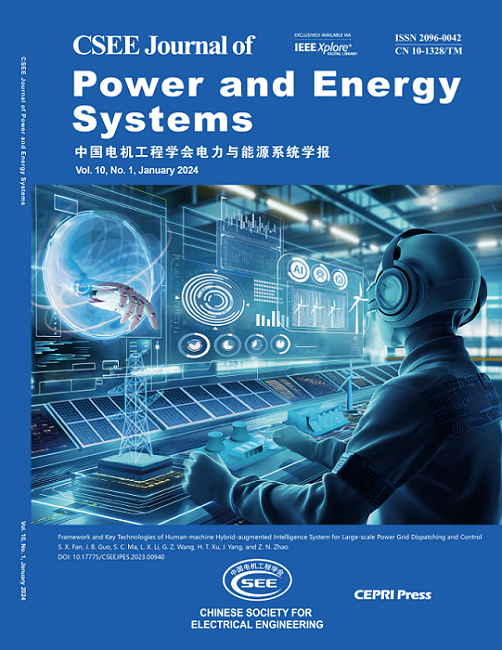A Planning Model for Optimal Sizing of Integrated Power and Gas Systems Capturing Frequency Security
IF 5.9
2区 工程技术
Q2 ENERGY & FUELS
引用次数: 0
Abstract
Large renewable penetration has been witnessed in power systems, resulting in reduced level of system inertia and increasing requirements for frequency response services. There have been plenty of studies developing frequency-constrained operation models for power system security. However, most existing literature only focuses on operational level rather than planning level. To fill this gap, this paper proposes a novel planning model for the optimal sizing problem of integrated power and gas systems, capturing both under and over frequency security requirements. A detailed unit commitment setup considering different ramping rates is incorporated into the planning model to accurately represent the scheduling behavior of each individual generator and accurate inertia calculation. The power importing and exporting behaviors of interconnectors are considered, which can influence the largest loss of generation and demand, accounting for under and over frequency security, respectively. Additionally, a deep learning-based clustering method featured by concurrent and integrated learning is introduced in the planning model to effectively generate representative days. Case studies have been conducted on a coupled 6-bus power and 7-node gas system as well as a 14-bus power and 14-node gas system to verify the effectiveness of the proposed planning model in accurate clustering performance and realistic investment decision making.获取频率安全的电、气集成系统最优规模规划模型
可再生能源在电力系统中的大规模渗透,导致系统惯性水平降低,对频率响应服务的要求增加。针对电力系统的安全问题,人们对频率约束运行模型进行了大量的研究。然而,大多数现有文献只关注操作层面,而不是计划层面。为了填补这一空白,本文提出了一种新的规划模型,用于综合电力和天然气系统的最优规模问题,同时捕获低频和超频安全要求。在规划模型中引入了详细的考虑不同爬坡率的机组承诺设置,以准确地表示每个发电机的调度行为和精确的惯性计算。考虑了互连器的电力输入和输出行为,它们分别影响了低频和超频安全,对发电和需求的损失最大。此外,在规划模型中引入了一种基于深度学习的并行集成学习聚类方法,有效地生成具有代表性的天数。通过对6总线电源和7节点燃气耦合系统以及14总线电源和14节点燃气系统的案例研究,验证了所提出的规划模型在准确的聚类性能和现实的投资决策方面的有效性。
本文章由计算机程序翻译,如有差异,请以英文原文为准。
求助全文
约1分钟内获得全文
求助全文
来源期刊

CSEE Journal of Power and Energy Systems
Energy-Energy (all)
CiteScore
11.80
自引率
12.70%
发文量
389
审稿时长
26 weeks
期刊介绍:
The CSEE Journal of Power and Energy Systems (JPES) is an international bimonthly journal published by the Chinese Society for Electrical Engineering (CSEE) in collaboration with CEPRI (China Electric Power Research Institute) and IEEE (The Institute of Electrical and Electronics Engineers) Inc. Indexed by SCI, Scopus, INSPEC, CSAD (Chinese Science Abstracts Database), DOAJ, and ProQuest, it serves as a platform for reporting cutting-edge theories, methods, technologies, and applications shaping the development of power systems in energy transition. The journal offers authors an international platform to enhance the reach and impact of their contributions.
 求助内容:
求助内容: 应助结果提醒方式:
应助结果提醒方式:


